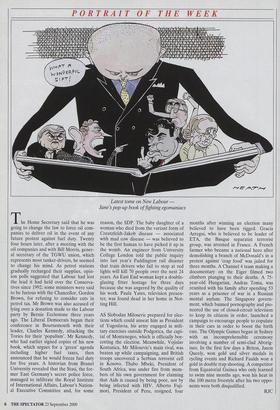PORTRAIT OF THE WEEK
Latest tome on New Labour - Jane's pop-up book of fighting egomaniacs The Home Secretary said that he was going to change the law to force oil com- panies to deliver oil in the event of any future protest against fuel duty. Twenty four hours later, after a meeting with the oil companies and with Bill Morris, gener- al secretary of the TGWU union, which represents most tanker-drivers, he seemed to change his mind. As petrol stations gradually recharged their supplies, opin- ion polls suggested that Labour had lost the lead it had held over the Conserva- tives since 1992; some ministers were said to be furious with the Chancellor, Gordon Brown, for refusing to consider cuts in petrol tax. Mr Brown was also accused of lying over a donation made to the Labour party by Bernie Ecclestone three years ago. The Liberal Democrats began their conference in Bournemouth with their leader, Charles Kennedy, attacking the Tories for their 'populism'. Mr Kennedy, who had earlier signed copies of his new book, which argues for a 'green' agenda including higher fuel taxes, then announced that he would freeze fuel duty for five years. A historian from Brunel University revealed that the Stasi, the for- mer East Germany's secret police force, managed to infiltrate the Royal Institute of International Affairs, Labour's Nation- al Executive Committee and, for some reason, the SDP. The baby daughter of a woman who died from the variant form of Creutzfeldt-Jakob disease — associated with mad cow disease — was believed to be the first human to have picked it up in the womb. An engineer from University College London told the public inquiry into last year's Paddington rail disaster that train drivers who fail to stop at red lights will kill 70 people over the next 24 years. An East End woman kept a double- glazing fitter hostage for three days because she was angered by the quality of his work. Paula Yates, television presen- ter, was found dead in her home in Not- ting Hill.
AS Slobodan Milosevic prepared for elec- tions which could unseat him as President of Yugoslavia, his army engaged in mili- tary exercises outside Podgorica, the capi- tal of Montenegro, which is officially boy- cotting the election. Meanwhile, Vojislav Kostunica, Mr Milosevic's main rival, was beaten up while campaigning, and British troops uncovered a Serbian terrorist cell in Kosovo. Thabo Mbeki, President of South Africa, was under fire from mem- bers of his own government for claiming that Aids is caused by being poor, not by being infected with HIV. Alberto Fuji- mori, President of Peru, resigned, four months after winning an election many believed to have been rigged. Gracia Arregui, who is believed to be leader of ETA, the Basque separatist terrorist group, was arrested in France. A French farmer who became a national hero after demolishing a branch of McDonald's in a protest against 'crap food' was jailed for three months. A Channel 4 team making a documentary on the Eiger filmed two climbers plunging to their deaths. A 75- year-old Hungarian, Andras Toma, was reunited with his family after spending 53 years as a prisoner of war in a Russian mental asylum. The Singapore govern- ment, which banned pornography and pio- neered the use of closed-circuit television to keep its citizens in order, launched a campaign to encourage people to copulate in their cars in order to boost the birth rate. The Olympic Games began in Sydney with an incomprehensible ceremony involving a number of semi-clad Aborig- ines. In the first few days a Briton, Jason Queely, won gold and silver medals in cycling events and Richard Faulds won a gold in double trap shooting. A competitor from Equatorial Guinea who only learned to swim nine months ago, won his heat in the 100 metre freestyle after his two oppo- nents were both disqualified.
RJC






















































































 Previous page
Previous page